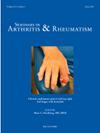Aortic disease in giant cell arteritis
IF 4.6
2区 医学
Q1 RHEUMATOLOGY
引用次数: 0
Abstract
The increasing use of non-invasive vascular imaging has allowed for improved detection of aortic disease in patients with vasculitis. Indeed, up to 70 % of patients have radiographic evidence of aortitis at GCA onset and aortic dilatation is already identified in about 15 %. Aortic inflammation is generally diagnosed by imaging studies such as CT angiography, MR angiography or FDG-PET, and occasionally by histopathology following resection of the aorta for aneurysm repair. Aortic inflammation may be clinically silent but is a risk factor for progressive aortic dilatation and aneurysm formation in GCA. By comparison, aortitis in Takayasu arteritis may lead to aortic dilatation or stenosis, particularly in the descending thoracic and abdominal aorta. The risk of thoracic aortic aneurysm in patients with GCA has been estimated to be up to 17-fold higher than that of the general population, with up to 1/3 of patients developing aortic aneurysm at 10 years of follow-up. Moreover, chronic smoldering aortitis may be refractory to current therapy, lasts for several years and contributes to progressive aortic dilatation. A rare but life-threatening complication of GCA-associated aortic disease is dissection or rupture. Observational studies are informing outcomes and management of inflammatory aortic aneurysms, while transcriptomic and molecular studies on aortic tissue are yielding important information regarding disease pathogenesis. These endeavors are critical to reducing the excess mortality related to aortic disease in GCA. Also, improved understanding of the pathophysiology of the disease is allowing the development of non-glucocorticoid targeted therapies.
巨细胞动脉炎的主动脉病变。
随着非侵入性血管成像技术的日益普及,脉管炎患者主动脉疾病的发现率也有所提高。事实上,多达 70% 的患者在 GCA 发病时已有主动脉炎的影像学证据,约 15% 的患者已发现主动脉扩张。主动脉炎症一般通过 CT 血管造影、MR 血管造影或 FDG-PET 等影像学检查来诊断,偶尔也可通过动脉瘤修补术切除主动脉后的组织病理学检查来诊断。主动脉炎症在临床上可能是无声的,但却是 GCA 中主动脉逐渐扩张和动脉瘤形成的危险因素。相比之下,高安动脉炎的主动脉炎可能会导致主动脉扩张或狭窄,尤其是降胸主动脉和腹主动脉。据估计,GCA 患者罹患胸主动脉瘤的风险是普通人群的 17 倍,多达三分之一的患者在随访 10 年后会罹患主动脉瘤。此外,慢性烟雾性主动脉炎可能对目前的治疗无效,持续数年,并导致主动脉逐渐扩张。GCA相关主动脉疾病的一种罕见但危及生命的并发症是夹层或破裂。观察性研究为炎性主动脉瘤的治疗结果和管理提供了依据,而主动脉组织的转录组和分子研究则为疾病的发病机制提供了重要信息。这些努力对于降低 GCA 主动脉疾病导致的过高死亡率至关重要。此外,对该疾病病理生理学的进一步了解也有助于开发非糖皮质激素靶向疗法。
本文章由计算机程序翻译,如有差异,请以英文原文为准。
求助全文
约1分钟内获得全文
求助全文
来源期刊
CiteScore
9.20
自引率
4.00%
发文量
176
审稿时长
46 days
期刊介绍:
Seminars in Arthritis and Rheumatism provides access to the highest-quality clinical, therapeutic and translational research about arthritis, rheumatology and musculoskeletal disorders that affect the joints and connective tissue. Each bimonthly issue includes articles giving you the latest diagnostic criteria, consensus statements, systematic reviews and meta-analyses as well as clinical and translational research studies. Read this journal for the latest groundbreaking research and to gain insights from scientists and clinicians on the management and treatment of musculoskeletal and autoimmune rheumatologic diseases. The journal is of interest to rheumatologists, orthopedic surgeons, internal medicine physicians, immunologists and specialists in bone and mineral metabolism.

 求助内容:
求助内容: 应助结果提醒方式:
应助结果提醒方式:


